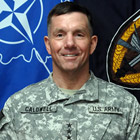"a soldier interacting, without mediation"


Operations
Kairos: The Army recently approved a new career field specialty in electronic warfare, with the projected goal—according to COL Jet Bibler's February 26, 2009, article in The Nexus, "Rebuilding the Army's Electronic Warfare Capability"—of training "a Brigade Combat Team (BCT) with the capability to dominate the EMS in any type of deployment environment" (p. 4). The development of this career field specialty is partly in response to the way Al-Qaeda in Iraq has (again according to COL Bibler) "effectively leveraged EMS (electromagnetic spectrum) technologies to create a sophisticated information operations campaign that was achieving strategic impact" (p. 1). Yet the Combined Arms Center's documentation (New Electronic Warfare Career Fields, 2009) for the new career field specialty in electronic warfare indicates that its focus is "tactical and operational" rather than strategic. Are there ways the Army is orienting its training and doctrine around the strategic uses of electronic and new media communications, beyond simply emphasizing the tools and tactics associated with digital communications? In what way does learning to leverage interactive Internet technologies make soldiers and officers more adaptive and creative and better able to engage in modern warfare? How is the Army trying to win the "information war"? Have they been successful at strategically leveraging technology to become "gatekeepers and agenda-setters" (Caldwell, Murphy, & Menning, 2009, p. 4)? Why or why not?
Lt. Gen. Caldwell: Being comfortable engaging the information environment though social media and traditional media allows for a more credible interaction between soldiers and the public at large, whom we serve. We don't want to be gatekeepers as we use the media or the Internet to share our story. If some of our stories help engage and inform people about what we do each day, and results in changed perception, of course I hope it is in a good way. The intent is to not use technology to be gatekeepers or agenda setters, but instead to increase transparency and credibility. The more accessible we are to those who support us worldwide, the more support we can gain through that transparency and increased credibility.
Kairos: In a speech on September 27, 2007 (Caldwell, 2007b), you asserted that "[t]here is one guy in this world who really understands the true role and importance of the media on the modern battlefield," Ayman al-Zawahiri. You quoted Zawahiri's 2005 letter to Abu Musab al-Zarqawi, wherein he stated, "More than half of this battle is taking place in the battlefield of the media" and suggested that many in the military fail to grasp the implications of that insight (Caldwell, 2007b). In response, you've promoted the concept of strategic communications: a shift from a public affairs emphasis on broadcasting to a rhetorically nuanced emphasis on narrowcasting, getting the right message to the right people. In your Combat Studies Symposium presentation (Caldwell, 2007a), you defined strategic communications as consisting of "efforts to understand, engage, and enhance credibility with key audiences to promote awareness, understanding, commitment, and ultimately positive action in support of the Army." In the same presentation, you defined information operations as the "[i]ntegrated employment of electronic warfare, computer network operations, psychological operations, military deception, [and] operations security; in concert with specified supporting capabilities to influence, disrupt, corrupt, usurp, [and] protect" (Caldwell, 2007a). It sounds like you're proposing a complex relationship between rhetoric and technology in the connection you draw between strategic communications and information operations: Can you say more about that relationship?
Lt. Gen. Caldwell: Strategic communication is an integrated, coordinated process to help ensure we don't commit "information fratricide." Information operations is one of the components that is integrated in the process of strategic communication. Strategic communication is an effort to ensure our deliberate communication activities in the information environment, which aren't always bound by technology, are coordinated and consistent in our messages. These activities can be as basic as a soldier's interaction with a villager or more complex such as public affairs activities—but coordinated to provide coherence to our mission.